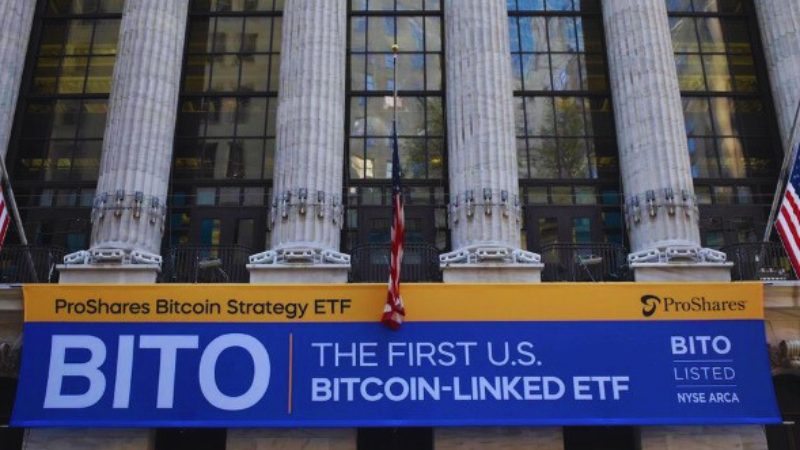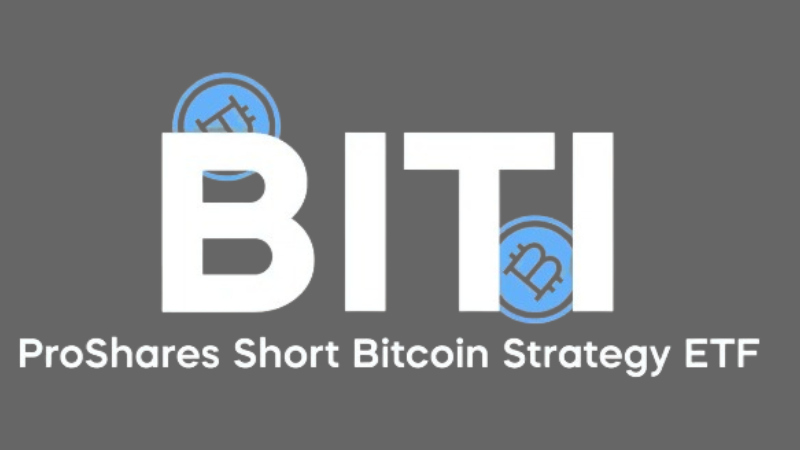Bitcoin ETFs offer an easy way to invest in Bitcoin without having to buy or store it yourself. They combine the convenience and security of traditional investments with exposure to the cryptocurrency market. Investors often choose Bitcoin ETFs for simplicity, lower risk, and regulatory oversight.
Currently, these ETFs invest mainly in Bitcoin futures or crypto-focused companies, while direct Bitcoin ETFs are still under review by regulators.
What Is a Bitcoin ETF?
A Bitcoin futures ETF represents an exchange-traded fund that encompasses assets correlated with the price of Bitcoin, and it is traded on a conventional exchange as opposed to a cryptocurrency exchange.
The principal assets in a Bitcoin futures ETF are futures contracts traded on the renowned Chicago Mercantile Exchange (CME).
These futures contracts represent formalized commitments between two entities to exchange a specified amount of assets at an agreed price on a predetermined time in the future.
Here’s the step-by-step process of how these ETFs come to life:
Step 1
The organization acquires futures contracts from CME Group.
Step 2
These contracts are then aggregated into a collective fund.
Step 3
This fund is subsequently made available to potential investors on an exchange, enabling them to purchase fund shares.
Step 4
Post-creation, professionals actively manage the futures contracts contained within the fund.
Bitcoin ETF Strategies
When investing in Bitcoin through exchange-traded funds (ETFs), several options are available to investors, each with its unique approach to capital appreciation and risk management.
ProShares Bitcoin Strategy ETF (BITO)
The ProShares Bitcoin Strategy ETF (BITO) was the first Bitcoin ETF allowed to trade in the US. Since its launch in October 2021, BITO has become one of the most heavily traded
ETFs, attracting approx $1 billion in assets within a few days.
BITO is a fund that is managed proactively with the objective of achieving capital growth when investing in Bitcoin futures contracts in a transparent manner. Additionally, it may allocate funds to Treasury securities and cash holdings.

ProShares Short Bitcoin ETF (BITI)
The ProShares Short Bitcoin ETF (BITI) is the only ETF approved by the SEC that aims to trade the inverse of Bitcoin’s daily performance.
BITI seeks to provide returns that are the opposite of the S&P CME Bitcoin Futures Index on a daily basis.
The fund sustains its opposing position by participating in the market for cash-settled futures.
VanEck Bitcoin ETF (XBTF)
The VanEck Bitcoin Strategy ETF (XBTF) is a well managed fund since November 2021. XBTF seeks to provide capital appreciation by investing in BTC futures and may also invest in Treasuries and cash.

One advantage of XBTF is its tax-efficient structure as a C-corp, which allows investors to potentially lower taxable distributions.
Valkyrie Bitcoin Strategy ETF (BTF)
The Valkyrie Bitcoin Strategy ETF (BTF) is another actively managed ETF launched in October 2021. It offers investors exposure to Bitcoin futures contracts and aims for capital appreciation.
When considering Bitcoin ETFs, investors should carefully evaluate factors such as total assets under management, investment strategies, and tax implications.
Detailed research and consultation with a financial advisor are essential before making investment decisions.
Valkyrie Bitcoin Strategy Fund
The Valkyrie Bitcoin Strategy fund focuses on allocating its net assets to Bitcoin futures contracts.
Any remaining assets are invested in U.S. government security, money market funds, and corporate bonds.
Simplify Bitcoin Strategy PLUS Inc ETF
The Simplify Bitcoin Strategy PLUS Inc ETF is an actively managed fund launched in September 2022.
It generates capital appreciation by investing in Bitcoin futures and utilizes short-dated put or call spreads on global equity indices to generate income for investors.
Global X Blockchain & Bitcoin Strategy ETF (BITS)
The Global X Blockchain & Bitcoin ETF (BITS) is a well managed fund launched in November 2021. BITS divides its holdings between Bitcoin futures contracts and indirect holdings in blockchain companies.
These indirect investments take the shape of shares in its affiliated ETF, the Global X Blockchain ETF (BKCH), which has a portfolio comprising diverse stocks related to blockchain technology.
Bitcoin ETF Overview
A Bitcoin ETF is a type of exchange-traded fund that predominantly allocates its resources into assets related to Bitcoin.
These ETFs issue shares to investors through the open market, utilizing the generated funds to establish a portfolio that mirrors a specific market index or asset class, such as cryptocurrency.
Currently, there are seven Bitcoin ETFs approved by the SEC for trading in the US.
Over 20 Bitcoin ETF filings are awaiting SEC approval, with some directly holding Bitcoin. Bitcoin recently hit a 17-month peak amid rumors of a BlackRock ETF launch.
Methodology for Selecting Bitcoin ETFs
To select the best Bitcoin ETFs, ETFs primarily trading in blockchain-related stocks or other cryptocurrencies were excluded. The remaining ETFs were filtered based on total assets under management (AUM) exceeding $10 million.
Reasons for Not Holding Bitcoin
Bitcoin ETFs do not hold Bitcoin due to concerns about trading on unregulated cryptocurrency exchanges. SEC Chair Gary Gensler has emphasized the regulated futures market as a safer approach for Bitcoin ETFs.

Understanding Futures Contracts
Futures contracts are agreements to sell a specific asset at a future date. They allow traders to speculate on future price movements with minimal upfront investment, often utilizing leverage or borrowed money.
When the price of BTC increases, BITO utilizes its profits to contribute to a funding pool consisting of cash and Treasuries.
Conversely, if the price of BTC decreases, funds from the pool are used to cover the losses on futures contracts.
Different Approaches
Most of the Bitcoin ETFs mentioned here employ a similar strategy. It is worth noting that the ProShares Short Bitcoin ETF (BITI) follows a slightly different approach by attempting to earn money in the opposite direction of BTC’s price movements.

Cost Comparison
Owning a Bitcoin ETF may be more costly than simply buying Bitcoin on a cryptocurrency exchange.
This is because cryptocurrency exchanges typically charge one-time fees for buying and selling Bitcoin, whereas owning a Bitcoin ETF incurs an annual expense ratio fee.
Considerations for Fees
For example, if you were to buy Bitcoin on Coinbase, you would likely pay around 0.5% of your purchase price as a fee. This is lower than the annual fees charged by Bitcoin ETFs, which are all at least 0.65% per year.
However, the trading fee is not the only factor to consider. You should also consider whether you plan to transfer your Bitcoin to a separate hot or cold crypto wallet.
If so, there may be withdrawal fees, which are usually small but vary depending on the exchange.
At Coinbase, these withdrawal fees amount to 1% per transaction. While this may be negligible for most transfers, it is still important to keep in mind.
Exit Strategy Considerations
Additionally, you should consider your exit strategy. Even long-term holders of Bitcoin may need to sell portions of their holdings.
This means incurring trading fees once again. On Coinbase, these fees are approximately 0.5%.
Convenience vs. Higher Fees
That being said, shorter-term holders of an ETF may not mind the relatively higher fees they face because of the convenience provided by ETFs.
Security & Accessibility Concerns
Certain investors might find comfort in acquiring exposure to Bitcoin through the purchase of a professionally managed ETF as opposed to holding the actual BTC in their portfolios.
Alternative Investment Options
The widespread adoption of Bitcoin as an investment is relatively recent, and some individuals may have concerns about hacking or the risk of losing passwords or private keys required to access their investment when it is stored in a secure Bitcoin wallet.
Accessibility Limitations
Furthermore, not everyone finds buying Bitcoin through a crypto exchange suitable for them. Almost anyone can open a Coinbase account, but not everyone feels like doing this.
For some reasons, others may be restricted to buying and selling securities through their traditional brokerage accounts.
Buying Bitcoin ETFs
Once an investor opens their account, they can buy Bitcoin ETFs in the same way they would purchase any other stock or ETF.
The first step purchasing a ETF Bitcoin is to open a brokerage account. There are numerous online brokers available nowadays.
Expense Ratio
Unlike traditional stocks, ETFs come with an annual expense ratio that will be deducted from the investor’s account.
Investing in Cryptocurrencies
The world of cryptocurrency investment can be both exciting and daunting, with significant opportunities for gain as well as risks:
Volatility and Risk
Bitcoin, along with other cryptocurrencies, represents a relatively recent addition to the world of finance, characterized by its volatility.
Investors should only allocate money they are willing to lose and ought to consult a financial advisor before making any investment decisions. It is essential to take these precautions to make informed choices that align with one’s financial goals and risk tolerance.
Forbes Advisor Insights
When it comes to analyzing the ins and outs of investing in an array of financial instruments – from stocks and bonds to cryptocurrencies – Forbes Advisor is a treasure trove of expert analysis and advice.

Uncertain Future
Cryptocurrencies, Bitcoin included, have demonstrated a tendency for rapid and substantial price shifts within short timeframes. The trajectory of these digital assets continues to be shrouded in uncertainty.
Individual Assessment
The question of whether cryptocurrencies, and Bitcoin in particular, are a sound choice for long-term investment hinges on the individual investor’s evaluation. Engaging with a financial advisor is often a prudent step.
Risk Management
While every investment comes with its own set of risks, the volatile nature of cryptocurrencies like Bitcoin is noteworthy. Investors must be cautious not to invest more than they afford to lose and should always seek the counsel of a financial advisor.
Bitcoin ETF Fees
Investing in a BTC ETF can sometimes be costlier than directly purchasing Bitcoin through a cryptocurrency exchange.
Let’s break down the costs associated with each:
Purchasing Bitcoin on an Exchange (e.g., Coinbase):
- One-time trading fee of approximately 0.5% of the transaction amount.
- Potential withdrawal fees if transferring Bitcoin to a separate wallet, usually around 1% per transaction.
- Additional trading fee of about 0.5% when selling Bitcoin.
Investing in a Bitcoin ETF:
- Annual expense ratio fee of at least 0.65%.
- Convenience for short-term holders due to the ease of trading on traditional exchanges.
So, Bitcoin ETFs charge an annual fee, while crypto exchanges usually have one-time fees for buying and selling.
Additional costs may include withdrawal fees and trading fees when selling your holdings.
Short-term holders may find the convenience of a ETF for Bitcoin worth the comparatively higher fees.
Bitcoin ETFs and Regulation
All SEC-approved Bitcoin ETFs in the United States hold Bitcoin futures contracts rather than individual Bitcoin. This is due to the SEC’s concerns about the lack of regulation in Bitcoin trading on exchanges and the associated risks for investors.
The Purpose Bitcoin ETF prioritizes the security of its Bitcoin holdings by storing them in offline storage, also known as “cold” storage.
This means that the Bitcoin is not actively connected to the internet, reducing the risk of cyberattacks. However, for temporary transactions such as buying or selling Bitcoin, the ETF utilizes an online or “hot” wallet.
ETF Regulation Concerns
There are certain concerns surrounding the regulation of ETFs. These include management fee structures, uncertainty about Bitcoin’s true intrinsic value, and the uncertain regulatory future of the underlying asset.
Why Should You Buy a Bitcoin ETF Instead of Bitcoin?
These ETFs stand out as they directly own cryptocurrencies, unlike other ETFs that merely track the crypto industry’s fluctuations without holding Bitcoin or Ethereum.
The importance of these funds not relying on derivatives, feeder funds, or engaging in lending or staking activities cannot be understated.
Reasons to Consider Bitcoin ETFs:
Crypto ETFs provide superior security, according to ETF Securities. They utilize “cold storage” to protect Bitcoins from hackers, employ sharding to disperse private keys across global vaults, and require multi-person approval for Bitcoin movements.
Security
Additionally, the ETF’s cold storage is safeguarded in a Faraday cage to prevent damage from power surges.
Tax Advantages
Crypto ETFs offer ease of tax reporting, especially beneficial if Bitcoin is part of a self-managed superannuation portfolio (SMSF).
ETFs can be easily integrated into existing SMSF infrastructure, reducing workload for accountants and potentially lowering capital gain taxes.
Comparing ETFs and Bitcoin Ownership
While directly owning Bitcoin and Ethereum can be cost-effective due to the absence of commission or management fees, and provides the flexibility to easily exchange them for other cryptocurrencies, it lacks the robust security measures and tax advantages offered by Bitcoin ETFs.
Therefore, if you value security and ease of tax reporting, opting for a Bitcoin Exchange traded fund could be the more prudent choice, despite the associated fees.
The comprehensive institutional-grade security arrangements and tax benefits make Bitcoin ETFs a compelling option for those looking to invest in cryptocurrency while mitigating risks and simplifying tax reporting.
Consider these alternatives:
Investment Options Comparison
- Full ownership of assets
- Available on exchanges
- Diversified exposure
- Professionally managed
- Indirect exposure
- Traditional stock benefits
- Simplified investment
- Available in retirement accounts
Remember that all investment options carry unique risks and potential rewards. Past performance does not guarantee future results.
The Future of Bitcoin ETFs
Bitcoin, along with other cryptocurrencies, has exhibited remarkable volatility, with significant fluctuations in price over brief durations.
The trajectory of these assets in the future remains uncertain. Since its creation, Bitcoin’s value has reached highs exceeding $60,000 and later plummeted to under $19,000.
The suitability of cryptocurrencies, especially Bitcoin, as long-term investments is a decision that rests with each individual investor.
Nonetheless, it is advisable for investors to seek guidance from a financial advisor prior to finalizing any investment choices.
Best Bitcoin ETF: Conclusion
Bitcoin ETFs offer a regulated and convenient pathway for investors to gain exposure to Bitcoin.
They cater to individuals who wish to invest in Bitcoin while benefiting from the accessibility and security provided by traditional investment vehicles.
However, it is crucial to choose a reputable platform and understand the regulatory landscape before investing.
Furthermore, exploring other crypto-related investment options then Bitcoin ETF may be worthwhile.
FAQs About Best Bitcoin ETF
A Bitcoin ETF (Exchange-Traded Fund) is a financial product that allows investors to buy and sell shares representing ownership of Bitcoin without the need to directly acquire or store the cryptocurrency. It offers a convenient and regulated way to gain exposure to Bitcoin’s price movements through traditional brokerage accounts.
✅ Indeed, Bitcoin and its cryptocurrency counterparts are deemed speculative assets, often experiencing marked fluctuations in their values. This characteristic renders these ETFs susceptible to considerable price swings, adding an element of risk to such investments.
Seven Bitcoin ETFs have been approved by the SEC for trading in the US, with more than 20 additional Bitcoin ETF filings awaiting approval. Some of these filings directly own Bitcoin.
Crypto Exchange-Traded Funds (ETFs) are crafted to replicate the performance of the assets, thereby allowing investors to partake in the substantial price movements inherent in the crypto market. Nevertheless, the pronounced volatility in cryptocurrency prices introduces heightened risk when investing in crypto ETFs.
Investing in a Bitcoin ETF requires a brokerage account that allows trading on the ETF’s stock exchange. Once your account is set up, you can buy shares of the Bitcoin ETF through your broker, and the value of these shares will track the performance of Bitcoin.
